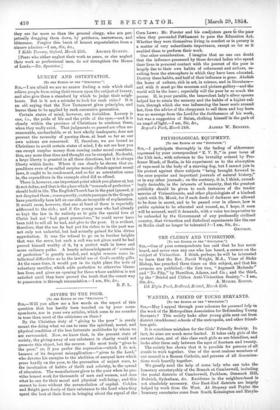LUXURY AND OSTENTATION.
(TO TER EDITOR OP THE " SPECTATOR."1
am afraid we are no nearer finding a rule which shall relieve people from using their reason upon the subject of luxury, and also give them a standard by which to judge their neigh- bours. But is it not a mistake to look for such rules ? It is an old saying that the New Testament gives principles, and leaves them to be applied by each successive generation.
Certain states of mind, however, are forbidden. Luxury is one, i.e., the pride of life and the pride of the eyes,—and it is clearly within the province of Christians to condemn these, when they really exist. That judgments so passed are often un- reasonable, uncharitable, or at best wholly inadequate, does not prevent the necessity of passing them, at least so far as our own actions are concerned. If, therefore, we are bound as Christians to avoid certain states of mind, I do not see how you can except surplus money from coming under moral considera- tion, any more than time and thought can be excepted. No doubt, a large liberty is granted in all these directions, but it is always liberty within limits. Where it can clearly be shown that ex- penditure even of so-called surplus money offends against moral laws, it ought to be condemned, and so far as ostentation came in, the expenditure in the example cited did so offend.
There is, however, one important point which you glance at, but do not define, and that is the place which "counsels of perfection" should hold in life. The English Church has in the past ignored, if not despised them ; consequently, certain passages in the Gospels have practically been left on one side, as incapable of explanation. It would seem, however, that one at least of them is especially addressed to the rich ; and if the young man who had already so kept the law in its entirety as to gain the special love of Christ had not "had great possessions," he could never have been told to sell all he had, and give to the poor. It is evident, therefore, that the use he had put his riches to in the past was not only not unlawful, but had actually gained for him divine approbation. It was the refusal to go on to further heights that was the error, but such a call was not given until he had proved himself worthy of it, by a perfect walk in lower and more ordinary paths. A hearty acknowledgment of " counsels of perfection" is greatly needed, and might remove some in- tellectual difficulties as to the lawful use of God's earthly gifts. At the same time, it would put in its right place the note of voluntary sacrifice, which adds perfection to otherwise blame- less lives, and gives an opening for those whose ambition is not satisfied until they have proved the truth that the surest way to possession is through renunciation.—I am, Sir, &c.,
B. P. L.


































 Previous page
Previous page